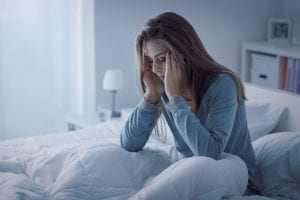
You probably know from personal experience that the COVID-19 pandemic has wreaked havoc on sleep for many people. If your own sleep hasn’t been affected, chances are you know someone who has experienced sleep problems in the past year and a half.
It’s not surprising that the combination of schedule changes, increased screen time, and elevated levels of stress and anxiety—all caused by the global pandemic—would disrupt our sleep. A new systematic review quantifies the sleep effects of the COVID-19 pandemic.
For the review, researchers identified 44 studies on sleep problems during the COVID-19 pandemic that included more than 54,000 participants from 13 countries. Combining the data from those studies, they found that more than 35 percent of the general population experienced disrupted sleep related to the COVID-19 pandemic.
Health care workers experienced similar sleep problems compared to the general population—about 36 percent had trouble sleeping. People diagnosed with COVID-19 had, by far, the highest prevalence of sleep problems; nearly 75 percent reported trouble sleeping.
The authors note that the prevalence of sleep problems in the general population is similar to the prevalence of stress, anxiety, and depression, according to another recent review article. This could suggest, they wrote, a connection between mental health and sleep during the pandemic.
Improving sleep quality
While not foolproof, there are concrete, evidence-based strategies that can improve sleep quality. Data show good sleep hygiene is important. This means keeping a regular schedule for waking and going to bed and reserving your bed for sleeping only. If you’re working at home, it’s much better to work in the kitchen or living room than in your bedroom.
Getting enough physical activity, along with avoiding alcohol and caffeine, especially later in the day, has been proven to improve sleep length and quality.
Exposure to light helps to regulate sleep cycles, so spending time outside in daylight will send a cue to your body that it’s time to be awake. If you live in the northern latitudes, which experience longer periods of darkness this time of year, that could mean getting outside during your lunch break or using a broad-spectrum light to simulate sunlight in the mornings.
If good sleep hygiene isn’t enough, there are some proven treatments for insomnia. A large body of evidence demonstrates that cognitive-behavioral therapy is an effective treatment for insomnia. The therapy works by helping you control or eliminate negative thoughts and worries that keep you awake and develop good sleep habits.
The take-home message: The COVID-19 pandemic has led to sleep disturbances in people across the globe. Data show that good sleep hygiene, diet, physical activity, and cognitive behavioral therapy can help.



Speak Your Mind